2016 Summer Camps and Programs at Penn
ENRICHMENT AND RECREATION
Anthropologists in the Making:
June 27-August 19. Penn Museum invites campers ages 7-13 to explore ancient and contemporary cultures through eight unique weeks of interactive gallery tours, art activities, scavenger hunts, games and special guest demonstrations. Monday-Friday, 9 a.m.-3 p.m. This year’s themes are:
June 27-July 1: Game On! Search for game pieces and sporting equipment in the Museum’s galleries. Design and build your own game for your family to play at the conclusion of camp.
July 5-8: Mysterious Civilizations. Explore monumental structures and architecture whose function and construction continue to stump archaeologists and engineers today.
July 11-15: Digging Greece and Rome. Uncover artifacts of the Mediterranean world and piece together the stories of your dig finds.
 July 18–22: Furry Friends and Savage Beasts. Travel the world to learn about creatures that went beyond the title of family pet. Discover cryptozoology and hear some trickster tales.
July 18–22: Furry Friends and Savage Beasts. Travel the world to learn about creatures that went beyond the title of family pet. Discover cryptozoology and hear some trickster tales.
July 25-29: Herstory. Meet mythological goddesses, scary witches and larger-than-life heroines.
August 1-5: Myths and Mysteries of Egypt. Discover the role of mystical items as you tour the Museum’s galleries. Recreate tales featuring Isis and Osiris, Seth and Horus, and more.
August 8-12: Magic in the Ancient World. Meet magicians, shamans and oracles. Learn how magic was used for personal gain and to foretell the future in the ancient world.
August 15-19: Culinary Expeditions. Search the galleries to find tools used to acquire, prepare and eat food. Design your own after-life feast, sculpt your own libation bowl and more.
Register by May 1: $290/week, $270/members. Register after May 1: $310/week, $290/members. Pre-camp (8-9 a.m.) and after-camp (3-5 p.m.) care is available for additional fees. Call (215) 898-4016, email summercamp@pennmuseum.org or visit http://penn.museum/camp
Morris Arboretum Summer Adventure Camp: June 20-August 5. At Morris Arboretum’s Summer Adventure Camp, thrill-seeking nature lovers ages 6-10 will find exciting adventures, experiments and crafts. Seven weeks of camp are offered, each with a different theme, but all feature water play, art projects, outdoor games and nature hikes to the Arboretum’s Springfield Mill. This year’s themes are:
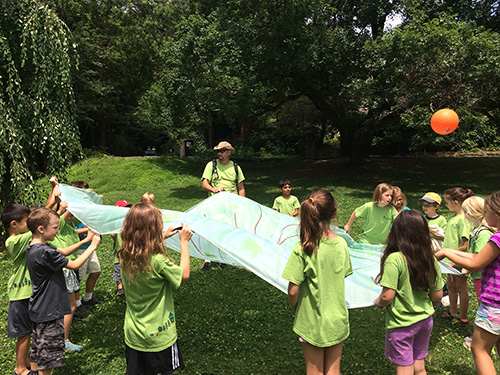 June 20-24: Habitat Heroes. Observe the furry, feathered and scaled animals that thrive in the gardens, and learn how to protect them.
June 20-24: Habitat Heroes. Observe the furry, feathered and scaled animals that thrive in the gardens, and learn how to protect them.
June 27-July 1: Mad Science Mayhem! Discover your inner Curie, Newton, Carson and Darwin through fun experiments.
July 5-8: Eco Expedition. Hike up and down the Arboretum’s wooded trails on a mission for discovery and adventure.
July 11-15: Buzzing Bees and Sensational Trees. Learn all about the Arboretum’s apiary and precious pollinators.
July 18-22: Flora, Fauna and Fun. Feed the Arboretum’s swan sisters—Flora and Fauna—and learn fun facts about these magnificent birds.
July 25-29: Art Week: Animal Safari. Paint, sculpt and draw using the Arboretum’s colorful habitats and wildlife as your muse.
August 1-5: Art Week: Budding Artists in Bloom. View botanical illustrations and floral-inspired art, then create your own masterpieces.
Each session runs Monday-Friday from 9 a.m.-3:30 p.m.
Register by March 1 to guarantee a spot and receive the early bird discount of 15% off tuition. Cost: $280/week, $300/non-members. For more information and to register, visit https://online.morrisarboretum.org/summercamp
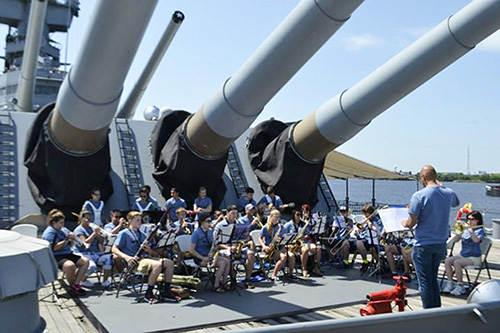 Penn Band Summer Music Camp: July 10-16. This program exposes high school instrumentalists to music and mirth on Penn’s historic college campus. Participants perform a diverse repertoire of challenging and gratifying band music. A low student-to-instructor ratio is maintained to insure a high level of instruction and attention to each student. The program includes guest lectures on topics in student leadership, group-building and conducting. Cost: $825/overnight residents; $395/commuters; children of Penn faculty & staff receive a 10% discount. Deadline: July 1. Register: http://www.dolphin.upenn.edu/pennband/pebc/register.html
Penn Band Summer Music Camp: July 10-16. This program exposes high school instrumentalists to music and mirth on Penn’s historic college campus. Participants perform a diverse repertoire of challenging and gratifying band music. A low student-to-instructor ratio is maintained to insure a high level of instruction and attention to each student. The program includes guest lectures on topics in student leadership, group-building and conducting. Cost: $825/overnight residents; $395/commuters; children of Penn faculty & staff receive a 10% discount. Deadline: July 1. Register: http://www.dolphin.upenn.edu/pennband/pebc/register.html
ATHLETICS
John Yurkow Baseball Camps: Penn employees, call (215) 746-2325 for a discount. Register: http://www.pennbaseballcamp.com
High School Summer Prospect Camp: June 13-14; camp for 9th-12th graders will consist of instruction and competitive games for a true college baseball experience.
Youth Quaker Baseball Camp @ Meikeljohn Stadium: Session 1: June 20-23; Session II: July 18-21, 9 a.m.-3 p.m. An organized and structured camp that focuses on preparing young players (ages 7-13) to refine their game. Competitive and challenging drills will be performed every day.
Penn Basketball Camps: Register: http://www.pennbasketballcamp.com
Steve Donahue’s Quaker Elite Basketball Camp: June 18, June 25 & August 20. College-caliber camp for serious high school players who are interested in playing at the collegiate level.
Women’s Elite Basketball Camp: dates to be announced. Rigorous program for highly motivated female student-athletes with the will and desire to play basketball at the collegiate level. Contact: bernl@upenn.edu
Steve Donahue’s Quaker Basketball Day Camp: June 27-July 1 & August 15-19. Discounts available for Penn employees. Instructional day camp where boys ages 7-14 learn the fundamentals in the historic Palestra with Penn’s coaching staff and players in a fun environment.
Penn Elite Field Hockey Camp: July 5-7. Camp will challenge players to elevate their game to the next level with high-intensity skills sessions and games reflective of collegiate play. Open to all high school age players. Cost: $530/overnight, $475/commuter. Information: https://pennfieldhockeycamps.com/elite-camp.php
Ray Priore Football Camps: Register: http://www.pennfootballcamp.com
One-Day Clinics: June 12, June 24, June 25, July 9, July 10 & July 15. Kicking One-Day Clinics: June 22 & July 8. Camp activities are structured to resemble Penn’s football practices. Athletes will be challenged and will compete in drills aimed at developing proficiency in each position. Open to participants entering grades 9-12. Cost: $75/kicking clinics; $150/all other clinics.
Youth Day Camp: June 20-23. The youth camp is designed to teach fundamentals of football and enjoyment of the game. Activities will include basic drills and activities to promote interest and understanding of basic football position skills and technique. Open to participants entering grades 4-8. Cost: $315.
Penn Lacrosse Camps:
Quaker Developmental Team/Individual Lacrosse: July 12-14 for boys entering grades 9-12; July 15-17 for boys entering grades 5-8. Athletes will be grouped based on ability and challenged accordingly. The staff is comprised of college coaches who will run each session like a college practice. Cost: $505/commuter; $631/residential. Register: http://quakerlacrossecamps.com/
Girls’ Elite Lacrosse Day Camps: dates to be announced. Information: https://pennlacrossecamps.com/
Quaker Rowing Camp: dates to be announced. For experienced and novice rowers (ages 13-18) looking to significantly improve their rowing ability. Instruction and coaching will be geared to the experience level and talents of each camper. Includes two daily practices on the water as well as active seminars on erg training and body circuits. Cost and registration: http://www.quakerrowingcamp.com
Rudy Fuller Soccer Camps: June 27-July 1 & August 1-5. For boys and girls in grades K-5. These Junior Quaker Camps offer players of various skill levels the opportunity to improve their soccer skills. Development of individual skills taught through fun exercises, daily competitions and small games. Cost: $300; discounts available. Register: http://www.rudy
fullersoccer.com/junior_quaker_camps.cfm
Penn Softball Camp: dates to be announced. For serious players, ages 13-18, looking to refine offensive and defensive techniques. Details and registration: http://www.pennsoftballcamps.com
Quaker Swim Camp: Session 1: June 13-17, Session 2: June 20-24, Session 3: July 11-15 (all dates tentative). A beginner to intermediate swim camp focused on quality drill work and proper swimming technique for swimmers ages 6-16. Cost: $425/competitive; $450/learn to swim; $400/two or more family members. Contact: Mike Schnur, mschnur@upenn.edu
Penn Tennis Camp: dates to be determined. A day camp for players of all experience levels, ages 5-17. Each one-week session will focus on stroke production and technical skills while incorporating sportsmanship and teamwork. The camp runs Monday-Friday, 9 a.m.-3 p.m. Cost: $385/one-week session or discounted rate of $340/per week for all three sessions. After-camp care is available from 3:30-6 p.m. for a fee of $20 per day. Register: www.penntenniscamp.com or (215) 315-3130.
Penn Track & Field Camp: June 26-29. Cost: $525/extended day; $625/overnight. Information and registration: https://penntrackcamps.com/
Penn Volleyball Camps: Players are grouped by skill and age level to maximize their potential and improve to the next level of play. Campers benefit from extensive, top-notch training in the areas of individual skill progressions, team systems and competition drills. Information and registration: http://www.pennvolleyballcamp.com
Penn Volleyball Clinic Series: August 4-7 (tentative dates); morning and afternoon sessions available. Open to all girls, ages 8-18.
Penn Volleyball Summer Camp: August 4-8 (tentative dates); overnight and day programs available. Open to all girls, ages 12-18.
ACADEMICS
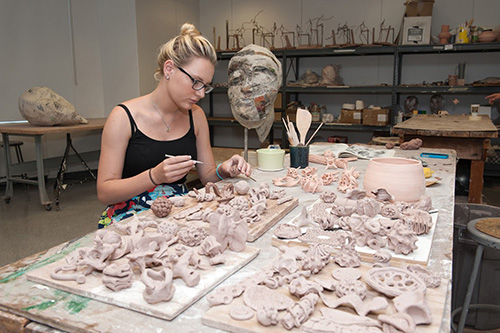 Art and Architecture Summer Programs: PennDesign offers two four-week summer programs (part of Julian Krinsky Camps and Programs) for high school students, ages 14-18, one in architecture and one in art. These programs prepare students for college admissions as they experience college life and create their portfolios. July 4-29/day program and July 3-30/residential program. Cost: $3,550/either day program; $5,975/residential art program; $6,250/residential architecture program. Deadline: rolling admissions. Apply for the art program at www.jkcp.com/program/art-summer-at-penn/ Apply for the architecture program at http://www.jkcp.com/program/architecture-summer-at-penn
Art and Architecture Summer Programs: PennDesign offers two four-week summer programs (part of Julian Krinsky Camps and Programs) for high school students, ages 14-18, one in architecture and one in art. These programs prepare students for college admissions as they experience college life and create their portfolios. July 4-29/day program and July 3-30/residential program. Cost: $3,550/either day program; $5,975/residential art program; $6,250/residential architecture program. Deadline: rolling admissions. Apply for the art program at www.jkcp.com/program/art-summer-at-penn/ Apply for the architecture program at http://www.jkcp.com/program/architecture-summer-at-penn
Penn Summer Science Initiative for High School Students: July 5-29. A free, four-week summer program for local juniors but occasionally well-qualified sophomores, in materials science and engineering. The program consists of lectures on materials, a computer lab, experimental labs and field trips to both industrial and Penn facilities. Deadline: April 15. Apply: http://www.lrsm.upenn.edu/outreach/pssi/
Provost Summer Mentorship Program: July 5-August 5 (tentative dates). Participants will gain knowledge in multiple fields of study, while also gaining exposure to the benefits of post-secondary education. This free program is for current freshmen and sophomore students who are enrolled in a public or charter school within the Philadelphia School District. Course programming is offered in the schools of Dental Medicine, Engineering & Applied Sciences, Law, Medicine and Nursing. Information: http://www.vpul.upenn.edu/aap/smp/index.php
Teen Research and Education in Environmental Science (TREES): June 27-August 12. Hosted by the Center for Excellence in Environmental Toxicology, TREES offers rising sophomores, juniors and seniors from local high schools a unique, hands-on research experience, lectures in environmental science, field trips and more. Students develop their own research projects. The tuition-free program lasts for about eight weeks. Deadline: March 1. Apply: http://ceet.upenn.edu/training-career-development/summer-programs/
Penn GEMS Camp (Girls in Engineering, Math and Science): July 25-29. The School of Engineering & Applied Science’s Penn GEMS program is a week-long day camp targeted at girls finishing 6th, 7th and 8th grade who are interested in math, science and engineering. Students work with faculty and students in bioengineering, materials science, graphics and computing. A special robotics-only track is also available. Applications will open in February. Deadline: April 3. Cost: $625; financial assistance is available for those who demonstrate need. Apply: http://www.seas.upenn.edu/awe/gems/ Contact: awe@seas.upenn.edu
iD Tech Camps: Co-ed, week-long, daytime camps are held for ages 7-17 in June, July and August. Participants learn code, game design, app development, web design, film, photography and more. Courses are designed to build critical science, technology, engineering and math (STEM) skills. Cost: $849-$949. Information & registration: https://www.idtech.com/locations/pennsylvania-summer-camps/philadelphia/id-tech-university-of-pennsylvania-upenn/
VETS (Veterinary Exploration Through Science): College/post-bac: June 6-10 & June 13-17; current high school juniors/seniors: July 11-15 & July 18-22; Monday-Friday, 9 a.m.-4 p.m. Offered by Penn’s School of Veterinary Medicine, VETS gives students the opportunity to take part in labs and lectures and shadow through clinics with fourth-year veterinary students at the Matthew J. Ryan Small Animal Hospital. Cost: $975. Deadline: April 4. Information: http://www.vet.upenn.edu/education/admissions/summer-vets-program
Julian Krinsky Summer Internship Program: June 26-July 16 and July 17-August 6. Depending on their chosen field, students spend three or six weeks working in an office, lab, studio, museum, sports venue or hospital, where they learn about the field, get work experience and live on campus at Penn. Transportation is provided to and from work. For rising high school juniors and seniors. Cost: $5,625/session. Deadline: rolling admissions. Apply: http://www.jkcp.com/program/internships-for-high-school-students.php
Engineering Summer Academy at Penn (ESAP): July 3-23. Sponsored by Penn Engineering, ESAP offers an opportunity for rising sophomores through seniors to experience rigorous and challenging college-level coursework. The residential program combines sophisticated theory with hands-on practical experience in cutting-edge technologies. Priority deadline: March 18; final deadline: May 13. Cost: $7,375; finan cial aid available. Contact: esap@seas.upenn.edu Apply: http://www.seas.upenn.edu/esap
Penn Summer Academies: July 3-23. Open to rising sophomores, juniors and seniors. Cost: $7,699/residential; $6,599/commuter; additional lab fees may apply for science academies. Deadline: May 15. For additional details and to apply, visit http://www.sas.upenn.edu/summer/programs/highschool
Biomedical Research Academy: Introduces students to the experimental basis of biology, including relevance to disease. Morning lectures cover the cellular, molecular and genetic aspects of biology, while afternoons are spent in the laboratory with hands-on experiments that introduce students to the tools and techniques used in biomedical research labs.
Chemistry Research Academy: Provides students with hands-on experiences in cutting-edge research projects in the chemical sciences, including synthesis and characterization of new compounds and materials, chemistry of life processes, spectroscopy and environmental photochemistry, nanoscale materials and molecular devices.
Experimental Physics Research Academy: Focuses on modern physics with an emphasis on hands-on experience and laboratory work. Program topics include mechanics, electromagnetism, quantum dynamics and astrophysics.
Neuroscience Research Academy: Introduces students to the biological foundations of the brain. Morning and afternoon lectures address important neuroscientific topics, progressing from the cellular foundations of the neuron, to an understanding of the sensory systems, and culminating with higher-order cognitive functions such as memory, emotion and morality.
Social Justice Research Academy: Students examine the historical importance and contemporary relevance of struggles to overcome inequality and injustice using past and present examples, such as peasant revolts, slave rebellions, anti-colonial and anti-apartheid independence movements, the Arab Spring, the Occupy movement and ongoing human rights campaigns.
Penn Summer Pre-College Program: June 28-August 6. This residential program is designed for students who are interested in a college experience typical of an undergraduate freshman. Participants enroll in one or two courses for academic credit and are fully integrated with Penn students. Academic advising, extracurricular activities and weekend trips are included. Open to rising juniors and seniors. Deadline: May 15. For costs and to apply, see http://www.sas.upenn.edu/summer/programs/highschool/precollege
Penn Summer Young Scholars Program: May 23-June 29 & June 30-August 5. This commuter program is an opportunity for academically exceptional local high school students to take college courses with Penn students and earn full college credit. Young Scholars can pursue their favorite discipline beyond the level offered in secondary schools, get a head start on their college requirements or explore a brand-new field that interests them. Open to rising juniors and seniors. Deadline: June 1. For costs and to apply, see http://www.sas.upenn.edu/summer/programs/highschool/youngscholars
Penn Law Pre-College Summer Academy: July 3-23. This residential academy is designed to give motivated rising high school juniors and seniors, as well as college freshman and sophomores, clear insight into US law and the legal profession. Deadline: rolling admissions. Cost: $7,899. Apply: http://www.summerdiscovery.com/penn-law
Penn Medicine Summer Program: July 3-30. A residential medical program (part of Julian Krinsky Camps & Programs) for rising high school seniors. Students are guided and taught by Penn Medicine faculty & staff and are immersed in the world of medicine as they explore the career possibilities available to medical students. Cost: $7,500; financial aid available. Deadline: March 18. Apply: http://www.jkcp.com/program/penn-medical-high-school-summer-program/
Leadership Education and Development (LEAD) Program at Wharton: July 3-23. The LEAD Program introduces youth of diverse backgrounds to key areas of business. First established at Wharton in 1980, the program features lectures by corporate executives and Wharton faculty, team-based assignments and visits to businesses in Philadelphia, Washington, DC and New York City. Cost: $3,000; financial assistance available. Deadline: March 1. For more information, call (215) 261-7001. Apply: https://www.wharton.upenn.edu/lead-program-wharton/
Leadership in the Business World (LBW): July 3-30. LBW is a program for talented and ambitious rising seniors in high school who want to learn about leadership in business. LBW features classes with Wharton professors, lectures from prominent business leaders, site visits to businesses in Philadelphia and New York City and team-based activities designed to enhance leadership skills. Cost: $7,295; need-based financial aid is available. Deadline: February 5. Apply: https://www.wharton.upenn.edu/leadership-business-world/
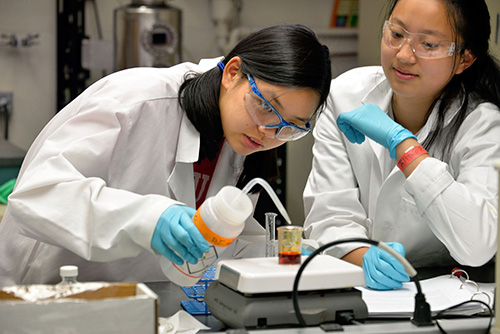 Management & Technology Summer Institute (M&TSI): July 10-30. M&TSI is a for-credit summer program for rising high school seniors and a select few rising high school juniors interested in exploring the integration of technological concepts and management principles. The program features classes taught by leading faculty and successful entrepreneurs, field trips to companies and R&D facilities, intensive team projects, as well as other activities designed to give students the opportunity to learn about the principles and practice of technological innovation. Cost: $6,500; need-based financial aid is available. Deadline: March 1. Apply: http://www.upenn.edu/fisher/summer-mt
Management & Technology Summer Institute (M&TSI): July 10-30. M&TSI is a for-credit summer program for rising high school seniors and a select few rising high school juniors interested in exploring the integration of technological concepts and management principles. The program features classes taught by leading faculty and successful entrepreneurs, field trips to companies and R&D facilities, intensive team projects, as well as other activities designed to give students the opportunity to learn about the principles and practice of technological innovation. Cost: $6,500; need-based financial aid is available. Deadline: March 1. Apply: http://www.upenn.edu/fisher/summer-mt
Wharton Sports Business Academy (WSBA): June 26-July 23. WBSA provides an opportunity for talented rising high school juniors and seniors to study sports business leadership at the Wharton School. This program teaches students about ownership, sports agents, marketing, media and labor as they meet and learn from leaders in the sports business world. Cost: $7,295; financial aid is available. Deadline: rolling admissions. Apply: http://wsb.wharton.upenn.edu/businesseducation-wsba.html
International Affairs: Leadership & Model UN: July 3-30. The residential program (part of Julian Krinsky Camps and Programs) features debate, public speaking, research workshops, social entrepreneurship, realistic United Nations simulations and guest speakers. Participants enjoy field trips to the United Nations in New York City and Embassy Row in Washington, DC, and experience culture through cuisine in Philadelphia. The program is designed to accommodate both new and experienced students, ages 14-18. Cost: $6,995. Deadline: rolling admissions. Apply: http://www.jkcp.com/modelun
Institute for Academic Studies (IAS): July 11-August 5 (deadline: June 3) and August 1-26 (deadline: June 24). Offered by the English Language Center, IAS provides a foundation for university-level English. Students receive an introduction to academic content-based language and experience life and culture at a US university. Guest lectures from Penn professors offer students a unique university experience. For students at least 18 years old with a language proficiency at the CEFR level of B1- as demonstrated by TOEFL iBT of 57+, TOEFL PBT of 487+, IELTS of 5.5+, or TOEIC of 550+. Cost: $2,982/session. Apply: http://www.sas.upenn.edu/elp/apply
Institute for Business Communication (IBC): July 11-August 5 (deadline: June 3) and August 1-26 (deadline: June 24). Offered by the English Language Center, IBC assists students in improving their business knowledge and communication. By using real-world business issues and topics, the program helps students enhance their professional skills. Guest lectures from Penn professors offer students a unique university experience. For students at least 18 years old with a language proficiency at the CEFR level of B1- as demonstrated by TOEFL iBT of 57+, TOEFL PBT of 487+, IELTS of 5.5+, or TOEIC of 550+. Cost: $2,982/session. Apply: http://www.sas.upenn.edu/elp/apply
International Business Communication for Professionals (IBCP): intermediate: July 11-22; advanced: July 11-August 5. Offered by the English Language Center, IBCP helps working professionals improve the effectiveness and confidence with which they communicate in professional situations in English. IBCP integrates targeted skills into simulations based on current international business cases. Cost: $2,095/intermediate session; $3,439/advanced session. Deadline: June 10. Apply: http://www.sas.upenn.edu/elp/apply
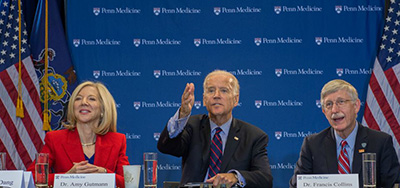
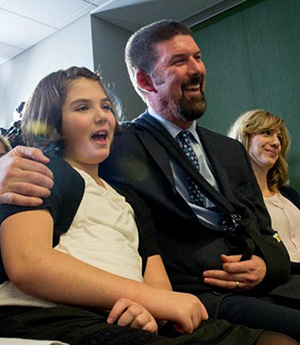

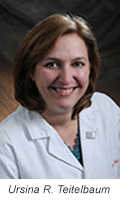 Ursina R. Teitelbaum has been named the Deenie Greitzer and Daniel G. Haller Associate Professor in the Perelman School of Medicine. Dr. Teitelbaum, a dedicated medical oncologist, exclusively cares for patients with gastrointestinal malignancies, and is a strong proponent of multidisciplinary approaches to pancreatic cancer. This chair will advance her research in gastrointestinal cancers, as well as her work in geriatric medicine and hospice and palliative care.
Ursina R. Teitelbaum has been named the Deenie Greitzer and Daniel G. Haller Associate Professor in the Perelman School of Medicine. Dr. Teitelbaum, a dedicated medical oncologist, exclusively cares for patients with gastrointestinal malignancies, and is a strong proponent of multidisciplinary approaches to pancreatic cancer. This chair will advance her research in gastrointestinal cancers, as well as her work in geriatric medicine and hospice and palliative care.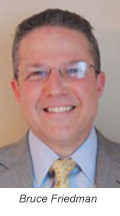 Penn’s Division of Business Services announces the appointment of Bruce Friedman as executive director, Fiscal Operations. Mr. Friedman is responsible for the effective and efficient stewardship of resources created through Business Services’ operating activities. In an operating capacity he also provides oversight to Penn’s Home Ownership Services (PHOS), the Morris Arboretum and the Campus Hotels.
Penn’s Division of Business Services announces the appointment of Bruce Friedman as executive director, Fiscal Operations. Mr. Friedman is responsible for the effective and efficient stewardship of resources created through Business Services’ operating activities. In an operating capacity he also provides oversight to Penn’s Home Ownership Services (PHOS), the Morris Arboretum and the Campus Hotels.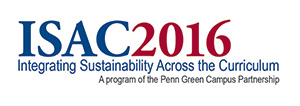 The Sustainability Office is currently accepting faculty proposals for the Integrating Sustainability Across the Curriculum (ISAC) program with a deadline of February 5. Now in its 5th year, ISAC provides paid interns to assist faculty in integrating sustainability into new or existing courses. Faculty work with an undergraduate research assistant, chosen through a competitive selection process, over eight weeks of the summer to update course content, adjust syllabi, presentations and reading lists, and modify exams to include environmental sustainability issues.
The Sustainability Office is currently accepting faculty proposals for the Integrating Sustainability Across the Curriculum (ISAC) program with a deadline of February 5. Now in its 5th year, ISAC provides paid interns to assist faculty in integrating sustainability into new or existing courses. Faculty work with an undergraduate research assistant, chosen through a competitive selection process, over eight weeks of the summer to update course content, adjust syllabi, presentations and reading lists, and modify exams to include environmental sustainability issues..jpg) Ellen O. Fuller, professor emeritus at Penn’s School of Nursing, died on November 16, 2015 at McLeod Hospice House in Florence, South Carolina. She was 92 years old.
Ellen O. Fuller, professor emeritus at Penn’s School of Nursing, died on November 16, 2015 at McLeod Hospice House in Florence, South Carolina. She was 92 years old.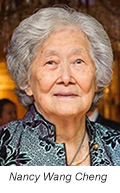 Nancy Wang Cheng, a retired Penn librarian of three decades, died in Philadelphia, Pennsylvania on December 31. She was 93 years old.
Nancy Wang Cheng, a retired Penn librarian of three decades, died in Philadelphia, Pennsylvania on December 31. She was 93 years old. July 18–22: Furry Friends and Savage Beasts. Travel the world to learn about creatures that went beyond the title of family pet. Discover cryptozoology and hear some trickster tales.
July 18–22: Furry Friends and Savage Beasts. Travel the world to learn about creatures that went beyond the title of family pet. Discover cryptozoology and hear some trickster tales. June 20-24: Habitat Heroes. Observe the furry, feathered and scaled animals that thrive in the gardens, and learn how to protect them.
June 20-24: Habitat Heroes. Observe the furry, feathered and scaled animals that thrive in the gardens, and learn how to protect them. Penn Band Summer Music Camp: July 10-16. This program exposes high school instrumentalists to music and mirth on Penn’s historic college campus. Participants perform a diverse repertoire of challenging and gratifying band music. A low student-to-instructor ratio is maintained to insure a high level of instruction and attention to each student. The program includes guest lectures on topics in student leadership, group-building and conducting. Cost: $825/overnight residents; $395/commuters; children of Penn faculty & staff receive a 10% discount. Deadline: July 1. Register:
Penn Band Summer Music Camp: July 10-16. This program exposes high school instrumentalists to music and mirth on Penn’s historic college campus. Participants perform a diverse repertoire of challenging and gratifying band music. A low student-to-instructor ratio is maintained to insure a high level of instruction and attention to each student. The program includes guest lectures on topics in student leadership, group-building and conducting. Cost: $825/overnight residents; $395/commuters; children of Penn faculty & staff receive a 10% discount. Deadline: July 1. Register:  Art and Architecture Summer Programs: PennDesign offers two four-week summer programs (part of Julian Krinsky Camps and Programs) for high school students, ages 14-18, one in architecture and one in art. These programs prepare students for college admissions as they experience college life and create their portfolios. July 4-29/day program and July 3-30/residential program. Cost: $3,550/either day program; $5,975/residential art program; $6,250/residential architecture program. Deadline: rolling admissions. Apply for the art program at
Art and Architecture Summer Programs: PennDesign offers two four-week summer programs (part of Julian Krinsky Camps and Programs) for high school students, ages 14-18, one in architecture and one in art. These programs prepare students for college admissions as they experience college life and create their portfolios. July 4-29/day program and July 3-30/residential program. Cost: $3,550/either day program; $5,975/residential art program; $6,250/residential architecture program. Deadline: rolling admissions. Apply for the art program at  Management & Technology Summer Institute (M&TSI): July 10-30. M&TSI is a for-credit summer program for rising high school seniors and a select few rising high school juniors interested in exploring the integration of technological concepts and management principles. The program features classes taught by leading faculty and successful entrepreneurs, field trips to companies and R&D facilities, intensive team projects, as well as other activities designed to give students the opportunity to learn about the principles and practice of technological innovation. Cost: $6,500; need-based financial aid is available. Deadline: March 1. Apply:
Management & Technology Summer Institute (M&TSI): July 10-30. M&TSI is a for-credit summer program for rising high school seniors and a select few rising high school juniors interested in exploring the integration of technological concepts and management principles. The program features classes taught by leading faculty and successful entrepreneurs, field trips to companies and R&D facilities, intensive team projects, as well as other activities designed to give students the opportunity to learn about the principles and practice of technological innovation. Cost: $6,500; need-based financial aid is available. Deadline: March 1. Apply:  Virginia Reef, director of large animal cardiology and diagnostic ultrasonography at Penn’s School of Veterinary Medicine, received the American Association of Equine Practitioners (AAEP) 2015 Distinguished Educator—Academic Award. Dr. Reef was honored last December during the President’s Luncheon at the AAEP’s 61st Annual Convention in Las Vegas, Nevada.
Virginia Reef, director of large animal cardiology and diagnostic ultrasonography at Penn’s School of Veterinary Medicine, received the American Association of Equine Practitioners (AAEP) 2015 Distinguished Educator—Academic Award. Dr. Reef was honored last December during the President’s Luncheon at the AAEP’s 61st Annual Convention in Las Vegas, Nevada.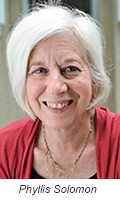 An academic paper published last year ranked School of Social Policy & Practice Professor Phyllis Solomon among the top most cited female academics in social work. Authors of the paper, entitled “Citation Impact of Women in Social Work: Exploring Gender and Research Culture” and published in the journal Research on Social Work Practice, set out to identify the high-impact female scholars in top-ranked schools of social work.
An academic paper published last year ranked School of Social Policy & Practice Professor Phyllis Solomon among the top most cited female academics in social work. Authors of the paper, entitled “Citation Impact of Women in Social Work: Exploring Gender and Research Culture” and published in the journal Research on Social Work Practice, set out to identify the high-impact female scholars in top-ranked schools of social work.-Beth.jpg) Beth Winkelstein, Penn’s vice provost for education and professor in the department of bioengineering, is the recipient of the 2016 American Society of Mechanical Engineers (ASME) Van C. Mow Medal. This honor “is bestowed upon an individual who has demonstrated meritorious contributions to the field of bioengineering through research, education, professional development, leadership in the development of the profession, mentorship to young bioengineers and with service to the bioengineering community.”
Beth Winkelstein, Penn’s vice provost for education and professor in the department of bioengineering, is the recipient of the 2016 American Society of Mechanical Engineers (ASME) Van C. Mow Medal. This honor “is bestowed upon an individual who has demonstrated meritorious contributions to the field of bioengineering through research, education, professional development, leadership in the development of the profession, mentorship to young bioengineers and with service to the bioengineering community.”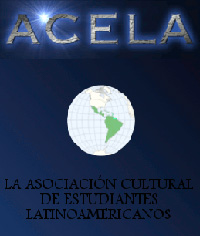 ACELA: La Asociación Cultural de Estudiantes Latino Americanos, a student-run organization, established in 1958, based in La Casa Latina.
ACELA: La Asociación Cultural de Estudiantes Latino Americanos, a student-run organization, established in 1958, based in La Casa Latina. MARS: Men Against Rape & Sexual Assault, previously 1 in 4, a men’s group that uses peer-education to combat sexual violence.
MARS: Men Against Rape & Sexual Assault, previously 1 in 4, a men’s group that uses peer-education to combat sexual violence.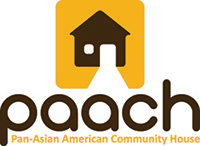 PAACH: Pan-Asian American Community House, central resource for advising students and student organizations with a particular focus on students of Asian American and Pacific Islander heritage, opened in 2000.
PAACH: Pan-Asian American Community House, central resource for advising students and student organizations with a particular focus on students of Asian American and Pacific Islander heritage, opened in 2000. SPEC: Social Planning and Events Committee, part of Connaissance, one of six branches of undergraduate government.
SPEC: Social Planning and Events Committee, part of Connaissance, one of six branches of undergraduate government. UTB: Under the Button, online blog for immediate and relevant news, gossip and entertainment for the University of Pennsylvania.
UTB: Under the Button, online blog for immediate and relevant news, gossip and entertainment for the University of Pennsylvania. If you love live entertainment, but could do without an extra commute, now is your chance to enjoy world-class performing arts at Penn’s Annenberg Center. On Wednesday, February 10, Annenberg Center Live will present an “early bird” 5:30 p.m. performance of William Shakespeare’s Twelfth Night, co-presented by Filter Theatre and Royal Shakespeare Company.
If you love live entertainment, but could do without an extra commute, now is your chance to enjoy world-class performing arts at Penn’s Annenberg Center. On Wednesday, February 10, Annenberg Center Live will present an “early bird” 5:30 p.m. performance of William Shakespeare’s Twelfth Night, co-presented by Filter Theatre and Royal Shakespeare Company. On Friday evening, January 29, members of Penn’s resident string quartet—the Daedalus Quartet (above left to right) Min-Young Kim, Thomas Kraines, Matilda Kaul and Jessica Thompson—will perform Janacek’s ‘Kreutzer Sonata’ and Schoenberg’s ‘Transfigured Night’ at the Arthur Ross Gallery along with Penn student actors Catalina Mullis and Max Gabarre-Grindrod and Philadelphia area dancers Megan Bridge and Beau Hancock. See On Stage.
On Friday evening, January 29, members of Penn’s resident string quartet—the Daedalus Quartet (above left to right) Min-Young Kim, Thomas Kraines, Matilda Kaul and Jessica Thompson—will perform Janacek’s ‘Kreutzer Sonata’ and Schoenberg’s ‘Transfigured Night’ at the Arthur Ross Gallery along with Penn student actors Catalina Mullis and Max Gabarre-Grindrod and Philadelphia area dancers Megan Bridge and Beau Hancock. See On Stage.